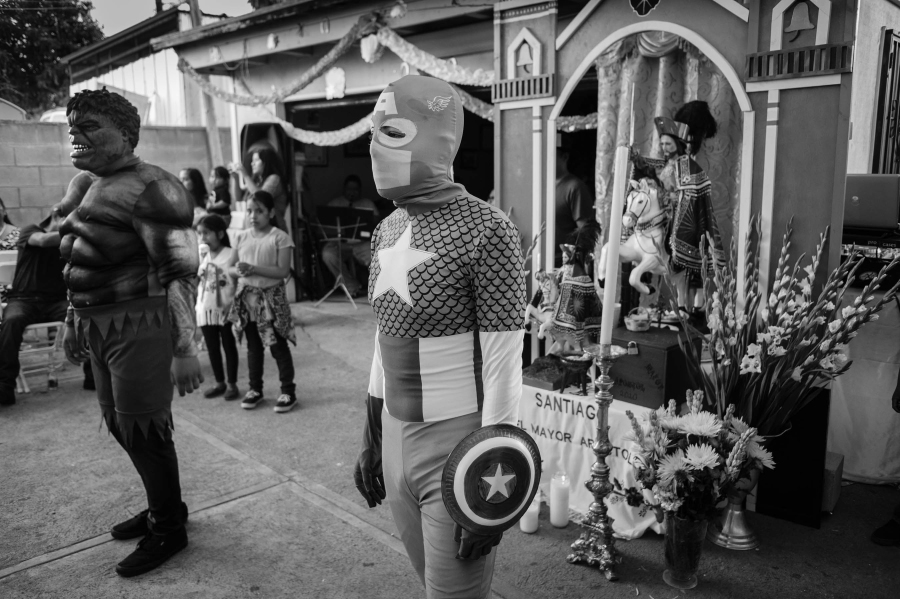The following translator’s note from Wendy Call and poems by Irma Pineda and translated from Zapotec into Spanish and English by Wendy Call come from Michigan Quarterly Review’s The Translation Issue: Within and Beyond the Metropole, Spring 2013. The full text of Wendy Call’s translator’s note and Irma Pineda’s poems may be found in our Archives.
Carrying Words Across Borders: Zapotec Poetry On/In Migration
Late last year, on one of winter’s longest, darkest nights, seventy people jammed a basement recording studio in Seattle to listen to Zapotec poetry. For poet Irma Pineda and for me, the evening marked the realization of a three-year collaboration—one still in progress. In 2008, one of my neighbors here in Seattle gave me two of Irma’s poems, hoping I might render them into English. My neighbor was a Zapotec immigrant from southeastern Oaxaca; for him those poems were voices from home. He gave them to me because I had lived in that part of Mexico and was writing a book about it; he couldn’t imagine anyone better to translate its poetry.
I wasn’t so sure. I’d published only two poem translations, working from poems originally written in Spanish, not in an indigenous language. I couldn’t quite imagine translating a poem that had been originally written in a language I did not read or understand. My knowledge of Isthmus Zapotec was limited to a couple dozen words for foods, places, and epithets.
Irma Pineda writes poems in Isthmus Zapotec (there are three distinct languages called Zapotec, as different from one another as Italian from Spanish) and then she recreates her work in Spanish. She does not call these Spanish versions translations, but rather parallel poems or mirror poems. She is adamant that the two versions are not equivalent to one another. Irma’s idea of parallel poems gave me the confidence to translate those two poems my neighbor had given me.
Entranced by her work, I later sent Irma an e-mail asking if she might be interested in having more of her work translated into English. Since we began corresponding, I have translated one book’s worth of Irma Pineda’s poems and I’m halfway through a second collection. We have worked out a three-stage translation (or recreation) process. First, I create a draft translation in English, based on the Spanish version of the poem. Then, I discuss that draft with Irma (who speaks almost no English). She answers any questions I have about the Spanish version and lets me know whether the (occasional) rhyme scheme or metrics of the Zapotec version are essential to the poem. She also gives me a deeper sense of the poem’s meaning and context. Twice I’ve traveled to her hometown of Juchitán, Oaxaca, so that we can review my translations in person. After our discussion, I create a new draft and seek feedback from US poets (who may or may not speak Spanish). Sometimes I ask for a literal Spanish translation of all or part of the Zapotec original—which is often quite different from her published Spanish version. The literal Spanish translation helps me render the poem more richly, or sometimes more precisely, in English. Sometimes I can recreate in English elements of the Zapotec original that she left out of her published Spanish version. In many ways, English and Zapotec come closer than Spanish and Zapotec do. (In fact, there is a growing Mexican-immigrant community in Los Angeles that is bilingual in Zapotec and English, but speaks little or no Spanish.)
Zapotec was a written language long before any other language currently spoken in the Americas was put on paper or carved into stone. Around 600 BCE, long before the Maya began carving words and stories onto stelae and pyramids, the Zapotecs began using a glyph-based system to record their history. This writing system persisted for fourteen hundred years, dying out half a millennium before Europeans arrived in the Americas. After that, Zapotec poetry and prose once again became an oral tradition. Then, 120 years ago, Isthmus Zapotecs began using a transliterated Latinate alphabet to record their poems, jokes, stories, and songs.
At the time Irma was writing her first poems, twenty years ago, there were five alphabet and syntax systems in use for Isthmus Zapotec. There was no real dictionary. Educated entirely in Spanish, Irma learned to read and write her home language through the few published Zapotec books on her family’s and neighbors’ bookshelves. She composed poems in her head, then hunted word by word through the books to find the words in her poems. Over the last decade, Isthmus Zapotec writers have come closer to settling on a single spelling system, though there is still no school in Juchitán in which all children are taught to read and write in the language they speak at home. For years, Irma has volunteered to teach such classes wherever and whenever local public schools will have her, in addition to her full-time job at a nearby teachers’ university. She is committed to educating teachers about the importance not just of bilingualism, but also of dual literacy…
Read the rest of Wendy Call’s essay here.

____________________________________
NI CHINEU‘[1]
Guluu chahui‘ ni chineu‘ cherica
‘bisaana guirá’ ni nanaa
guirá ni guchenda ñeeu lu ca neza ca
Nasisi bia‘ ti duubi nga cheu‘
ti ganda chu‘bilu‘ ti ganda guipápalu‘
Gula‘qui‘ chahui ni chinelu‘
bisaana yuuba‘ cheri‘
naa zanda gapa chahue‘ laa
bisaana xilase
qui gunihuará nga lii cherica‘
Huaxa si qui gusiaandu‘ chineu‘
xquenda beedxe‘ti gudxii lulu‘ ca neza ca
xquenda bisiá
ti qui gutagunacabe lii
Ra ga‘chi‘ xquipilu‘ nga guibiguetu‘
EL EQUIPAJE
Prepara tu equipaje
deja todo lo que pese
lo que pueda enredar tus pies en los caminos
Ligero como una pluma debes partir
para saltar para volar
Prepara bien tu equipaje
deja aquí el dolor
que yo bien puedo guardarlo
deja la nostalgia
para que no te enferme allá
Mas no olvidar llevar
el don del tigre
para enfrentar los caminos
el don del águila
para que ninguna mano te detenga
Al lugar que guarda tu ombligo debes volver
YOUR SUITCASE
Pack your suitcase
leave behind all that weighs on you
that could entangle your legs on your journey
You must leave light as a feather
to leap to fly
Pack your suitcase well
leave the pain here
I will take good care of it
leave the nostalgia
so it won’t make you sick over there
But don’t forget to take
the gift of the tiger
to face the long journey
the gift of the eagle
so no hands will capture you
To the place that holds your lifeline, you will returnb
LU NEZA
Ma ziula nga guca naa ca gubidxa zielu’
ne qui guidxela ni gusianda yuuba
daabi ndaani’ íque’
sicasi ñaca ti gudxiu’ natuumbu’ ruaa
chaahuidugá cuchuugu’ guendaredasilú
cuxuuxe xinaxhi
ne bandá’ ladilu’
ni cá dxiichi’ ru’
cue’ yoo yooxho’ ralidxinu
Xisi gudxiu’ di’ qui zaca
yuuba guuti xquenda ladxidua’
SOBRE EL CAMINO
Largos son los soles de tu ausencia
y nada encuentro para remediar este dolor
clavado en mi mente
como un cuchillo de boca torpe
que despacio corta los recuerdos
destroza sus olores
la sombra de tu cuerpo
que permanence adherida
a las paredes de la vieja casa
Mas no será el cuchillo
del dolor que nos asesine la esperanza
ON THE PATH
So long the many sunsets of your absence
and I’ve found nothing to ease this pain
hatcheted into my brain
like a dull blade
that slowly cleaves my memories
destroys their smells
the shadow of your body
that still clings
to the walls of the old house
But my pain’s blade
won’t kill our hope
Sidi riaba lu gui’chi’
nga dxido’ ni cayuti laadu
Paraa yené ñeeu lii
Xhi guriá guidxilayú cucaadiaga tuuxa
xquendaruxidxilu ya?
Xhi ndaa layú di’ caye’ xquendaruunalu’
Ratiica nuulu
bizeenda neca ti bere stiá
guedané stiidxalu’
zaa nacati’ guedandani rari’
ne nabana’ nisaguié
Una gota de sal sobre el papel
es el silencio que nos mata
¿Adónde te han llevado tus pasos?
¿En qué rincón del mundo
alguien escucha tu risa?
¿Qué pedazo de esta tierra bebe tus lágrimas?
En cualquier lugar en que te encuentres
envía palomas mensajeras
que nos traigan tu voz
sin importar que llegue aquí
con la tristeza de la lluvia
A drop of salt on paper
is silence killing us
Where have your footsteps taken you?
In what corner of the world
do they hear your laughter?
What shard of earth drinks your tears?
Wherever you are
send messenger pigeons
that might bring us your voice
Whether or not it arrives here
with the sadness of the rain
Cayé xquendaruxidxinu
sicasi cayé guendanabani ndaani’ guiigu’
“guiigu’ bi’cu’” biree lá ni
dxi bi’cu’ nisa
gudxite ndaani’ ni
Ti dxi gúcanu stale
ne zé ca bi’cu’ nisa
sicasi rié yanna ca nguiu
sicasi rié ca badunguiu
Tulaa gudii stipa ti guibani xcú nu ya?
pa ca biidxica cayeca’
Tulaa gusiidinu ca riuunda’ni bisiidi’ binnigula’sa laanu ya?
Ti ná huiini’ yaga ga’chi’ lade guié zadxelanu
zabidxi nisa guiigu’xisi qui zati binnizá
Se va nuestra sonrisa
como la vida en este río
“de las nutrias” le llamaron
cuando perros de agua
jugueteaban en él
Un día fuimos tantos
que las nutrias se marcharon
como se van ahora nuestros hombres
como se van los jóvenes
¿quién dará la fuerza para perpetuar nuestras raíces
si las semillas se van?
¿a quién habremos de enseñar los cantos
que de nuestros abuelos heredamos?
Una rama escondida hallaremos entre las piedras
Se secarán los ríos
más no morirán los binnizá.
Our smile floats away
like the life in this river
“of nutrias” they called it
when the river dogs
played games in it
One day there were so many of us
that the nutrias went away
like our men leave now
like young people leave
who will have the strength to sustain our roots
if the seeds float away?
to whom will we teach the songs
that we inherited from our grandparents?
We will find a hidden branch among the rocks
The rivers can dry up
but the binnizá will not die
Xilase qui raca nisa xa ñee binni
qui rigui‘ba’ deche mani‘
ni nuxale‘ laa ladxido‘
Riaana rari‘
naaze dxiichi‘
gui‘di‘ lu beela naná
caye‘ nisa ruuna binni
ne rusiayasi rini
Xilase qui rié di‘
sicasi rié nisa guiigu‘
laa raca ti nisado‘
qui ria‘ rixubiyú laanu.
La nostalgia no se hace agua bajo los pies
no se sube al lomo de ningún caballo
que la lleve lejos del corazón
Se queda aquí
aferrada
asida a la doliente carne
se bebe las lágrimas
y nos alborota la sangre
La nostalgia no se marcha
como el agua de los ríos
se vuelve un mar
que nos arrastra implacable
Nostalgia doesn’t melt like water underfoot
doesn’t climb on the back of a horse
to be carried far from our hearts
It stays here
anchored
rooted in racked flesh
drinking up tears
and roiling our blood
Nostalgia doesn’t flow away
like riverwater
but becomes a sea
pulling at us relentlessly
Translated from Spanish (and Zapotec)by Wendy Call
Notes
- From Xilase qui rié di’ sicasi rié nisa guiigu’/la nostalgia no se marcha como el agua de los ríos (Nostalgia Doesn’t Flow Away like Riverwater), Escritores en Lenguas Indígenas (Mexico city, 2007).



